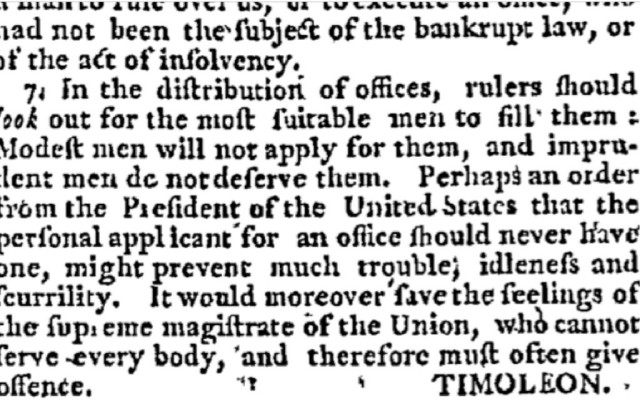Sampling four months of the Gazette of the United States reveals that, over thirty-one editions, that paper published thirty-nine pseudonymous articles. Contributors submitted a full 33 percent of these under a classical nom de plume. Within those same months, the National Gazette published thirty-three editions with sixty-one articles attributed to a concealed author; 31 percent of these writers obscured themselves behind a Greek or Roman personality. Taken together, roughly one third of the pseudonymous essays printed in both papers invoked the power of the classical world. While this essay is by no means comprehensive, the following examples uncover a pattern for how some contemporary contributors engaged ancient figures to articulate their republican order during the first Washington administration.
Shortly after George Washington took the first presidential oath of office under the new constitution, John Fenno established the pro-administration Gazette of the United States to endear the new federal system to Americans. Below are two examples from that newspaper reflective of how Federalists politicized ancient history through classical pseudonyms before Republicans responded in kind.
Championing elite rule, “Timoleon” educated the public on the necessary qualities national figures ought to possess to serve the federal government. Only men of pedigree with character and fortune great enough to resist corruption, he lectured, were fit for higher office. The people, he warned, ought to dismiss outright any man who openly sought public affection. This essayist communicated with an audience likely familiar with Plutarch’s Timoleon, the Greek warrior who killed his tyrant brother to protect the liberties of the polis. Later in life, the people summoned Timoleon from a self-imposed exile to rescue Syracuse from Carthaginian oppression. In the wake of Washington’s inauguration, the American Timoleon asked that voters only elevate men similar in character to the president to national positions. Washington, himself a man of virtue and wealth, left public life after vanquishing his British brothers to secure American liberty during the Revolution. And like Timoleon, he returned from this self-imposed exile to rescue the people from popular oppression. Through this pseudonym, the writer wrapped Washington and a patrician worldview in the robes of an ancient Greek to advocate an elite leadership class.

Signature of pseudonymous author “Timoleon” as seen in John Fenno’s Gazette of the United States,May 2, 1789. Notice that printers copied each pseudonym in all capital letters, allowing them to nearly function as a headline. (Author’s Collection)